How one retailer is dealing with the vegetable crisis in eastern Japan
One of the most frequently uttered phrases at the moment in Japanese news reports is fuu hyou higai (風評被害). It means damage that is caused by rumor or reputation, not necessarily based on fact. I already touched on the subject of the fuu hyou higai Japan is suffering overseas in my previous post, and I'll get back to that again, but today I'd like to address the fuu hyou higai that is going on within Japan itself.
More than 2 weeks ago, at the height of fears about radioactive materials being dispersed in the air by the Fukushima nuclear power plants, several vegetables plus raw unprocessed milk produced in 5 prefectures - Fukushima, Ibaraki, Gunma, Tochigi and Chiba - were found to have higher than allowed maximum levels of either iodide or cesium, and the central government imposed 3 levels of bans or warning notices on these items. This caused a lot of consternation in Japan, especially in the Tokyo-Kanto area, which is the main market served by the mostly small-scale, family run farmers in these prefectures. If you pull out a map of Japan and examine where these places are in relation to Tokyo, it will all make sense; they are all clustered to the north-east and east of the metropolis. If you're a locavore living in Tokyo, you would usually want to seek out fresh produce from this area.
While only a few specific vegetables were found to be contaminated to a level high enough to be restricted, concern about the safety of all vegetables produced in these areas has meant that prices for produce from the area have plummeted. Many people avoided buying anything from the area. Some retailers refused to take delivery or cancelled their orders. This was, and still is, becoming a vegetable crisis.
Promoting the safety of vegetables from the "hot" areas
To find out how this vegetable crisis was being dealt with on the retail level, earlier this week I went back to the department store with the impeccable produce section that I profiled last year, Takashimaya in Yokohama. As I mentioned back then, this branch has the highest foot traffic and sales in the entire Takashimaya chain, and their food hall is the star of the store.
The Takashimaya produce department is run more or less like a store within the store. Rather than just assign employees from the general pool as is done normally in a Japanese corporation, people with actual experience as greengrocers run the department. (The same goes for the fish department. The meat department is divided between an internally-run butcher shop and counter space assigned to and run by Maihan, a venerable butcher shop based in Nihonbashi, Tokyo.)
On the morning that I went to the produce department to interview the greengrocers and take photos, NHK television (the Japanese national broadcaster, equivalent to the BBC in the UK) also had a camera crew there to film the setting up of a special section featuring safe vegetables from those 5 prefectures, with a focus on products from Gunma prefecture. (NHK showed about 10 seconds of footage on the evening news that day as part of an overall report on the vegetable crisis.) Representatives from Gunma were there, some dressed in jaunty green happi (a happi is a lightweight kimono-type jacket worn by sellers at outdoor festivals and so on). The setup and the posters were colorful and cheerful, but there was a deadly earnest seriousness in the atmosphere.
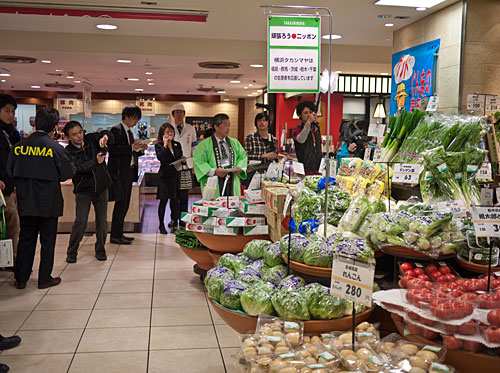
The whole display wrapped around a large column. One corner was dedicated to Gunma produce, and the rest was mostly taken up by a mix of vegetables from the other three prefectures. The Gunma banner in the photo says "Good - Gunma's Farm Produce" and features a cute farmer character. (Would it be Japan without a cute character to go with a campaign?) "Good" (pronounced guddo and Gunma are a play on words.
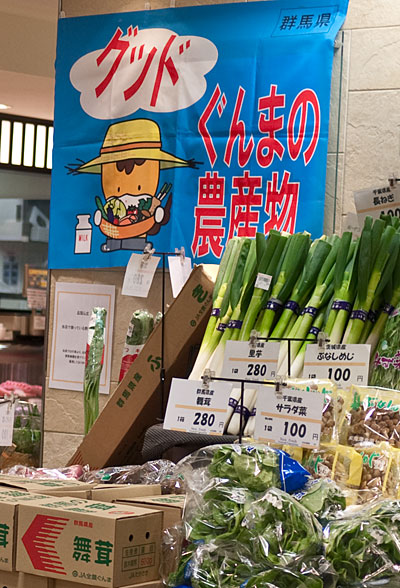
There was an additional sign displayed. It says "Ganbarou Nippon - Let's Go/Let's Do This Japan", and below: "Yokohama Takashimaya supports the producers of Fukushima, Gunma, Ibaraki, Tochigi and Chiba".
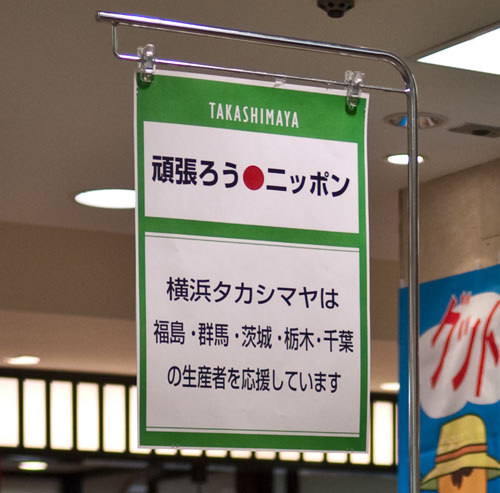
The produce was absolutely impeccable, as it always it at Takashimaya. The Momotaro tomatoes (greenhouse grown, but sweet and juicy) look like jewels. The green vegetables look similarly pristine.
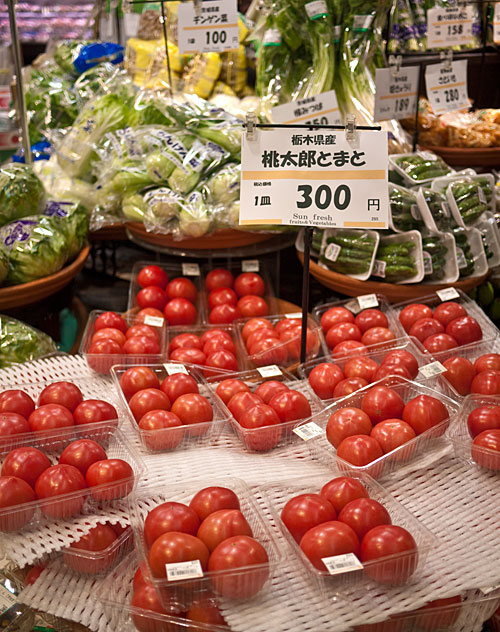
The prices were quite low. Iceberg lettuce from Ibaraki was only 100 yen per head - unthinkably cheap for Takashimaya. Iceberg lettuce from other areas of Japan, sold in a separate section, was 225 yen a head. The green asparagus from Tochigi in the photo below may look expensive at 680 yen for 4 fat stalks, but not by Japanese standards, for this quality. I saw big bunches of leeks for 100 yen, pak choi for 63 yen per pack, and more. If not for the cloud of contamination fears surrounding them, people would be going crazy over these vegetables.
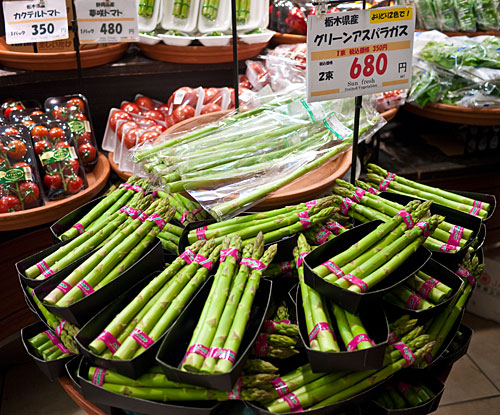
I was rather expecting to see vegetables from three of the prefectures - after all only a couple of vegetables in Gunma and Tochigi were found to have higher than desginated limits of radioactive materials. But I was a bit surprised to see quite a lot of vegetables from Fukushima too...I guess that was my own prejudice, or misconception, showing. The vegetables on the right with white stems in the photo below are really beautiful examples of mountain udo, a type of edible aralia that's in season for only a short time in the spring. Below is a box full of perfect, large fresh shiitake mushrooms, at 1500 yen the box. (The gorgeous garlic chives on the left are from Tochigi, and again are really cheap at 100 yen per bundle.)
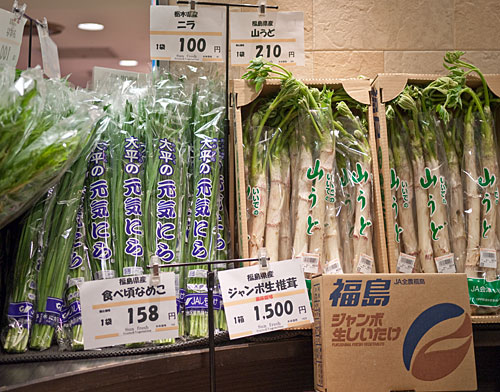
Takashimaya is really putting its reputation on the line by backing these local producers (all located within about 200-250km of Yokohama), and the safety of their products. (On the other side of the circular display were some really local produce, from the prefecture where Yokohama is located, Kanagawa. Apparently even those are feeling the hurt of fuu hyou higai these days, even though no vegetables from the area have been found to be unsafe.) The typical customer who shops for produce has Takashimaya is probably pretty well off, and can afford to go for the best. So, arguably having the backing of a store like Takashimaya, and being allowed to promote their produce there, means a whole lot more for the farmers of Gunma and the other affected prefectures than say, being in a discount supermarket. Takashimaya is also trying to get its customers to buy these vegetables of course. Whether they put their trust enough in the store to go along with this remains to be seen.
I stood in a corner observing the action around the feature display for some time. The tension emanating from the Gunma representatives was almost palpable. Whenever a customer approached the hot spot to look at the vegetables, you could almost see the Gunma reps straining to hold back from trying to hard-sell their vegetables. When a lady did finally pick up some lotus root and put it in her shopping basket, a rep bowed deeply to her to thank her...with the NHK camera and sound guys hovering right behind to catch the action. If I hadn't known the deadly seriousness behind his bow I would have been chuckling a bit at this excessive display of courtesy...but I couldn't. If the producers of Gunma and the other affected prefectures can't get customers to buy their produce again soon, they may lose their livelihoods.
According Mr. Morimura, the chief manager of the produce department, the situation was quite dire for the first few days. Suddenly they were unable to fill large sections of their shelves, since nothing was coming in from the affected prefectures. Several customers called in, some in a state of panic, asking about the safety of vegetables that they had purchased a couple of days before and whether they could get refunds. Even after shipments resumed from the 4 prefectures, they simply could not stock any vegetables from them because the customers were avoiding them. Since then, he said, things had improved considerably. Prices were still lower than usual for those vegetables, and many customers were still staying away from them, but a few were buying them again. Some because of the bargain prices, and others who expressed a desire to show their support for the farmers.
Mr. Iijima (pictured below sorting some shimeji mushrooms with an eagle eye), another manager, told me something else. He said that the shipments coming in from the affected prefectures now had printout sheets indicating that they had been tested for radioactive residue, and found to be within designated parameters. (I was rather astonished to find out that they routinely got in two to three shipments of the same type of vegetables per day, picked, packed and shipped within hours. Talk about fresh.) Farmers' associations, wholesellers and retailers have been clamoring for this kind of inspection and safety certification from the central government, but it's obvious they aren't waiting around for the government, but going ahead with their own inspections. The inspections are not officially sanctioned, but they are certainly better than not having any data at all.
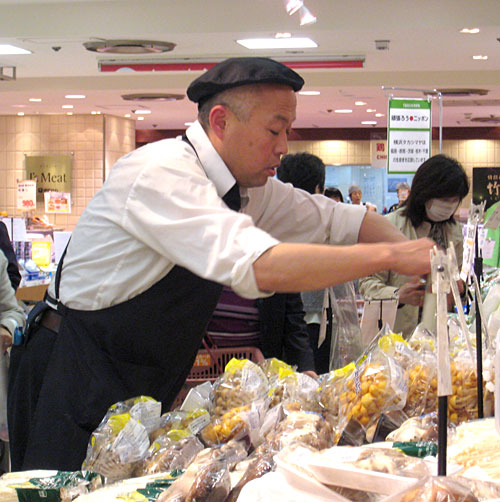
In the end, what it all comes down to is a matter of trust. The trust that Takashimaya or other retailers have in the wholesellers and the producers. The trust that the customer has in Takashimaya, or wherever they choose to shop. Normally food safety is overseen and certified by the government, but in this current situation where things are moving so fast, the government hasn't been able cope fast enough, so for now the private sector are trying to self-police themselves, until the government catches up. Everyone hopes that they do catch up very soon.
Consumers in Yokohama, Tokyo and the rest of the Tokyo metropolitan area can choose to stick to vegetables from other areas and avoid the 'local' produce entirely. Some are choosing to do so, and will probably continue to. Is it in their best interest to, even if it means potentially losing many of these local farmers? Time will tell.
I went back to just take a quick look a couple of days later (yesterday in fact). The feature section is still up, and it did seem like the produce was moving. The lone Gunma rep in a green happi there looked more relaxed than his colleague on the first day at least.
A note about fish
This article is about the vegetable situation, but I'm sure you're concerned about the fish and seafood situation too. Ironically, most of the fishing harbors and boats alone the north-eastern coast were destroyed or rendered inoperable in the earthquake and tsunami of March 11, and haven't been restored yet. The only nearby fishing going on when TEPCO started to release contaminated sea water (on purpose or inadvertently) from the Fukushima plants was in Ibaraki Bay, where kounago, a type of tiny fish, were found with higher than safe levels of radioactive material (higher than domestic levels that is; they would have been under EU or WHO established levels). As of this writing the Ibaraki fishing association has voluntarily stopped all fishing until further notice, while urging the government to get going with comprehensive inspections ASAP. If you look at sea current directions and proximity, there's a fairly good chance that the contaminated water will stray to the Chiba coasts, and a lesser chance that it will affect the fish off the coast of Kanagawa or Tokyo bay, though no fish from those areas have been reported to have any above-limits levels of any radioactive substances as of this writing.
What my family is buying these days
Prior to seeing this special display, my mother was staying away from all produce from the 'hot' prefectures, just like many other people. She's been re-thinking her stance a bit, and on the day of my investigation (she tagged along of course) she did pick up those gorgeous green asparagus spears from Tochigi. We had them for dinner pan-steamed (cooked in about half an inch of water in a pan, lid on, until tender), seasoned with a pinch each of sugar and salt, and finished with a bit of butter. They were sublime. Since then she's gotten some spring cabbage from the area too, and it was so sweet and tender. For her, the backing of a store she trusts really seemed to make a difference.
My sister on the other hand (who has kids), and lived in Machida, Tokyo, is still wary about buying from the area, though she says that if the reports improve she may start looking at them again - especially if prices are good.
For the moment both are staying away from fish from Ibaraki Bay, and even fish caught off the shore of Kanagawa. Although they may be overly cautious, both said they're going to wait awhile on that situation until there are better recommendations and guidelines. (They are buying fish from Hokkaido to the north, the Japan Sea side, and the south.)
[Update, April 29:] The situation changes all the time, and in the last couple of weeks or so both my mother and sister have been buying safe vegetables from affected areas. And just yesterday my mother got some really nice fresh squid caught off the shores of Kanagawa.
How about you?
If you live in the west or south of Japan, or in northern Hokkaido, you don't have much to worry about in practical terms. If you live in the Tokyo-metropolitan area and are wondering what to do, just look at the labels. Department stores and supermarkets all clearly indicate point of origin, and even small independent shops are doing that too now. This goes for fish and seafood as well as vegetables. By knowing exactly where something comes from, you can decide what's best for you. If you don't read Japanese, at the very least learn how the kanji for various prefectures look. The area prefectures or metropolitan areas you need to know are:
- 福島 - Fukushima
- 茨城 - Ibaraki
- 群馬 - Gunma
- 栃木 - Tochigi
- 千葉 - Chiba
- 埼玉 - Saitama
- 東京 - Tokyo
- 神奈川 - Kanagawa
(Incidentally, I saw some Tochigi-produced strawberries over in the fruit section, and asked whether the worry/avoidance and price drops had affected them too. Apparently not. Because they are grown in polytunnels maybe? But so are many of the vegetables people are avoiding. I just don't understand peoples' logic sometimes.)
In closing, admittedly I may be biased, but the usual safety standards for food products in Japan are so high (almost excessively so) that, barring products for which warnings have been issued, I still feel quite safe eating or drinking anything here. How you feel about it is up to you really.
Postscript
There are quite a few mom-and-pop greengrocers left in Japan, despite the proliferation of supermarkets, department store food halls and the like. There are several in my mom's neighborhood in suburban Yokohama; some are literally mom-and-pop places. All the ones I've looked at have the place of origin clearly marked for every item of produce they sell. (One store, which is a grandma-and-grandpa place, proudly proclaims that they 'only sell kokusan (domestically grown) produce'.) This week I have seen a lot of produce from the abovementioned areas on sale, such as nanohana from Chiba, broccoli from Tochigi, and so on. Since small stores cannot afford to take a loss if something doesn't sell, perhaps this means that consumers are becoming more willing to buy those vegetables now.
I hope to be able to talk to an area farmer soon too, for the other side of the story. I hope regular readers don't mind the lack of recipe posts at the moment, but I feel that reporting on what's going in in Japan is really important right now.)
Many thanks to Mr. Morimura and Mr. Iijima of the Takashimaya produce department, as well as to Mr. Hanai of the public relations department, for letting me have so much access and for patiently answering my questions.
Useful links
- Ministry of Health, Labor and Welfare (MHLW) information page in English. Links to PDFs past and latest recommendations. This page is constantly updated with new docs, so be sure you are grabbing the most recent ones to to get the current recommendations.
- World Health Organization (WHO) FAQS regarding Japan's nuclear concerns. Refresh to make sure you have the latest version.
- The latest WHO situation report (PDF) has a list of restricted and banned vegetables and other food products, as well as current country or region policies on food imported from Japan. (Notice the differences! Who's right and who's wrong?)
- Just for comparison, the EU guidelines for accepted radiation levels in food, drinking water, and more.
- Finally, this page is already getting a bit outdated, but a list of radioactive level monitoring points that I put together back in March. Look at the numbers and stay informed!
If you enjoyed this article, please consider becoming my patron via Patreon. ^_^

 Welcome to Just Hungry, where we serve authentic Japanese recipes and more! I'm
Welcome to Just Hungry, where we serve authentic Japanese recipes and more! I'm 














Comments
Marisa
8 April, 2011 - 03:43
Permalink
Re: How one retailer is dealing with the vegetable crisis ...
I must say, I really do miss shopping at Takashimaya (in Nagoya, rather than Yokohama) - such beautiful food! And yes, some of it is pricey, but I always did find wonderful deals on items in season.
My heart goes out to all the farmers and businesses who have been affected by the tragedy. I hope that the fear dissipates a little so that those who are still able to produce food can stay in business.
Tom
8 April, 2011 - 04:19
Permalink
Re: How one retailer is dealing with the vegetable crisis ...
The danger to vegetables is from the radioactive material - the radioactive iodine and cesium - adhering or being absorbed into the plant matter.
If the strawberries are grown inside a greenhouse, there would be much less danger regardless of where they were grown.
Farah
8 April, 2011 - 04:20
Permalink
Re: How one retailer is dealing with the vegetable crisis ...
Here in Malaysia we import of lot of things from Japan, food being some of them. Having quite a large Japanese community as well as quite some Japanese influence, it is of no surprise that we have Japanese retailers (such as Jusco and Isetan) here and I'm so very happy for it.
I am quite sad to see the overblown panic from threat of contaminated food being imported from Japan. It makes even less sense for people here to panic as food would not only have gone through checks in Japan, but also here in Malaysia. Plus the fact that much of the things on the shelves were imported before the quake even happened. Common sense is strangely uncommon.
But you'll be glad to know that from what I can see now (I was just at the Isetan supermarket yesterday; and they were having a Japan food fair), the radiation 'threat' is largely ignored. Flocks of people still buy food imported from Japan, most of which are packeted, or frozen. I did notice the lack of fresh produce but hopefully within time, those will once again be at the fresh food section.
People shouldn't panic before getting the facts.
avlor
8 April, 2011 - 04:27
Permalink
Re: How one retailer is dealing with the vegetable crisis ...
I wish I could visit and support the farmers there!
Mark II
8 April, 2011 - 04:49
Permalink
I'm not worrying about it for now
At the levels they've detected you'd have to eat an awful lot of the stuff over a long period of time to raise your risk. I figure if it's in the stores, it's probably more or less O.K., and I'll just wait two or three months and revisit things. By then I presume the government monitoring system will have gotten the kinks out, and anything I'd eaten until then won't have been in sufficient quantities to have caused me a problem. Japanese are sometimes slow to get going, but once they do, they do things right.
Marina Solovyov...
8 April, 2011 - 10:06
Permalink
Re: How one retailer is dealing with the vegetable crisis ...
Thank you so much for this article. I work with people on their diet and lifestyle in Tokyo, so many are worried about the effects of radiation on the food -- it is causing people to be sick with fear. This article will go a long way to giving people some courage to purchase groceries from local farmers in the north ( hopefully) and cook with more ease. Thank you!
Marcelle
8 April, 2011 - 12:53
Permalink
Re: How one retailer is dealing with the vegetable crisis ...
It would be interesting to see how restaurants and local eateries are coping with all this as well, whether they buy produce from these areas and whether they make this known to their customers. Maybe something you could investigate after talking to the farmers? =)
My heart goes out to all those families affected by these natural catastrophes and the ensuing nuclear threats.
kitty-chan
8 April, 2011 - 17:12
Permalink
Re: How one retailer is dealing with the vegetable crisis ...
When I was in Tokyo last year I was constantly trying to find deals on vegetables to the extent that grocery shopping sometimes took hours as I wondered from super market, to green grocer, to green grocer trying to save a few yen (what can I say the USD-JPY exchange rate was harsh). Given what I know about the disaster and the geography involved, and my rumbling thrifty stomach, if I were still there and I knew there was such a deal going on at Takashimaya I would go straight there and fill up a shopping cart!
Takashimaya always represented a level of quality in food that I could only longingly look at, but never afford. I think knowing the the vegetables were not the dangerous sort and the differences in legal limits, I would take advantage of such a "hot deal." (sorry for the pun...)
As for the Gunma poster, that little farmer is actually a dressed up version of Gunma-prefecture's official mascot character "Gunma-chan". Its a little pony that I've seen used the bulk of their advertising for events and travel. This may mean that the campaign is getting support from the prefectural level...
maki
8 April, 2011 - 17:27
Permalink
Re: How one retailer is dealing with the vegetable crisis ...
That's a detail I should have included. It is totally backed by the prefectural government. The flyer being handed out there had a personal letter from the governor of Gunma with a facsimile of his signature.
Michael
8 April, 2011 - 17:30
Permalink
"Safe" vs. ... "Acceptable"?
You lost me pretty early on by your use of the word "safe" when referring to contamination levels. There is no such thing, at least set by honest scientists. "Safe" levels are designated by the nuclear industry and the government regulators who support them. Perhaps there are "acceptable" levels, but particularly if one has children, I can fully understand the motivation for not accepting that theory. If the government is not doing testing and not being forthcoming about radiation levels, then certainly people are justified in being cautious. It is better to be safe than contaminated, because ingested radioactive material is the gift that keeps on giving.
Now perhaps in the Japanese the language is different and it is a translation issue, but in the U.S. when you read the word "safe" in regards to radioactive material, it is a sign that the source may be someone from the industry. Good journalism here is using different terminology.
maki
9 April, 2011 - 18:03
Permalink
Re: "Safe" vs. ... "Acceptable"?
The use of the word safe was not accurate, and I've now corrected that.
a physicist
12 April, 2011 - 05:54
Permalink
Re: "Safe" vs. ... "Acceptable"?
[quote=Michael]You lost me pretty early on by your use of the word "safe" when referring to contamination levels. There is no such thing, at least set by honest scientists.
[...]
Now perhaps in the Japanese the language is different and it is a translation issue, but in the U.S. when you read the word "safe" in regards to radioactive material, it is a sign that the source may be someone from the industry. Good journalism here is using different terminology.[/quote]
I'm not going to comment on whether or not these particular veggetables are safe/at acceptable radiation levels but I do take issue with you saying that anyone who says there is a safe level of radiation means that they are an industry insider.
Any honest scientist would point out that there's radiation all around us and inside us. Do you consider bananas safe? Bananas have radioactive potassium in them but most people consider those safe. If you're going to go with a literal definition of safe(doing no damage) then bananas aren't safe. However, the damage is inconsequential, easily repaired by the body, and the benefits of eating a banana far outweigh any risk and for all practical purposes most people, I think, would deem that "safe". Literally doing no harm, no, but effectively safe. There's radiation all around us even without nuclear plants and as a result our bodies are capable of repairing some amount of radiation damage. There are honest scientists, who are not nuclear industry insiders, who would be comfortable using the term "safe" to describe radiation levels on par with those received every day which are trivially repaired by the body.
irritated
13 April, 2011 - 22:08
Permalink
Re: "Safe" vs. ... "Acceptable"?
Physicist, you are just getting technical about what Michael said. Obviously Michael is implying that we can't completely trust what the government is saying regarding this situation because they have been down playing the severity since day one. And yes, there is radiation everywhere, even in bananas like you stated; but the difference between consuming radioactive bananas by one's choice and consuming something radioactive beyond its natural content b/c the government/scientists deemed it "safe" is a completely different matter. To Maki, I live in California and we detect radioactive matter from the Fukushima plant in our food (it's detected even in Nevada), so for you to say the people are overreacting is stubborn/ignornant patriotism. Yes, the amount of radioactivity won't kill you, but there is nothing "safe" nor "acceptable" about consuming it regularly for months to years to come. And people who are posting that the produce looks good and fresh- radioactive matter DOES NOT have a scent, taste, or necessarily change the appearance of something. One last thing, NHK is aired here at least 4 times a day and they are the ones who constantly report about radiation in food and the severe situation about the nuclear plant, not the local or national stations.
maki
14 April, 2011 - 04:06
Permalink
Re: "Safe" vs. ... "Acceptable"?
I do think people reacting about trace amounts of radioactivity, who then engage in other 'risky' behavior like smoking, or driving a car, or mountain climbing, are way overreacting. You simply cannot live without getting some level of radioactivity.If you are that scared, then why not avoid eating bananas, or getting X-rays, or taking a plane anywhere. You can choose not to believe me, or any number of medical professionals, the WHO, and so on if you so wish. If you say you are watching NHK then you are misreading the numbers quoted or just burying your head in the sand. (And one one hand you say the government is 'underplaying' things, while on the other you are saying the NHK is broadcasting 'severe' numbers. Make up your mind won't you?)
Also, you coming to my site and insulting me by calling me a 'blind patriot' is not going to get you anywhere. If you even bothered at all to find out about me you would know that I'm actually an American citizen. If this had happened in the United States, under similar circumstances, I would have had the same opinion.
I almost did not publish your comment but it gave me a chance to counteract the ignorant panic going around.
lludara
14 April, 2011 - 19:57
Permalink
Re: "Safe" vs. ... "Acceptable"?
Maki, agree with you 100%. This coming from someone who actually has a degree in NUCLEAR medicine. You have to realize there are different levels of 'acceptable' radiation for the general public vs. Rad workers. That being said, think about the thousands of workers who have been exposed to far more radiation then the general public and are fine. And for those who are totally freaked, you should look into the theory of radiation hormeisis. A theory that was born from studies done around hiroshima and nagasaki. The theory is still a theory yes, but goes to show that some radiation can be beneficial. Does this mean run out and get a ct? No.
And remember, radiation has a half life as well as a Biological half life. Lots of times the biological half life is even less because your body can get rid of it faster then it decays.
Time.
Distance.
Shielding.
anon.
14 April, 2011 - 04:35
Permalink
Re: "Safe" vs. ... "Acceptable"?
I completely agree with Maki here.
Oh, and I hope you don't plan on ever sleeping next to another person either because guess what, humans are also a little bit radioactive. The human body has radioactive iodine in it, just like bananas.
Cody
14 April, 2011 - 08:19
Permalink
Re: "Safe" vs. ... "Acceptable"?
I find it frustrating that people keep on stating that an increase in radiation will cause a negative effect on an individual. If you have no context to go on--there is no way to know if there really is any negative effect. In this case--you state that there are abnormally high amounts of radiation detected in food. My brother works at a company that has radiation detection equipment--and it is true to state that there are abnormally high levels of radiation detected within California--and thus, its food. This means nothing unless you know the actual amount of increase in radiation levels--which is less than 1 percent--and at a perfectly safe level. Safe meaning that there is no threat to an individual's health--young or old. You may not agree with me that the radiation is safe--as I say--and that's fine. I don't agree, though, with you stating a fact that can be misinterpreted. You state that food contains slightly radiation than normal--but, as I said, that means nothing unless you know how much more it contains. It just gives people more of a reason to overreact--and there is already enough of that.
Thank you Maki for providing useful information like this. It is nice to be able to get information on Japan without the spin that the news here typically puts on it.
Hopefully this post makes sense, it's late and I'm tired--though it makes sense when I re-read it.
Matt Katch
14 April, 2011 - 09:31
Permalink
Re: "Safe" vs. ... "Acceptable"?
I agree w/ Maki's assessment wholeheartedly. If this minute of radiation is a dire concern, I'd advise against any x-rays or airplane rides in your future. I live in southern Japan; also am an American citizen.
Vivian
8 April, 2011 - 17:52
Permalink
Re: How one retailer is dealing with the vegetable crisis ...
Thank you so much for reporting. I do very much enjoy your recipes, but it is so nice to get reports from someone who represents the average person and the families in Japan. While I'm sure your visit isn't what was originally expected, you are serving a greater cause now. Thanks and keep up the wonderful work. Blessings to you and your family.
DK
8 April, 2011 - 17:52
Permalink
Re: How one retailer is dealing with the vegetable crisis ...
Good for them! I think people can make up their own minds when it comes to what they buy. I'm sure many people are just thrilled to see food at this point. That produce looks just amazing. The food and shopping for it was my favorite part of being in Japan, hands down.
Joyce
8 April, 2011 - 22:22
Permalink
Re: How one retailer is dealing with the vegetable crisis ...
Thank you for your reports on what is happening regarding produce in Japan. We have a strong interest after volunteering last summer in Tochigi at the Asian Rural Institute. It's an amazing organic farm and leadership school. We're back in NH now, but know the staff have been concerned about area farmers being able to sell their produce. I look forward to recipes in the future, but think your insights are extremely valuable right now.
emi.lipe
9 April, 2011 - 00:21
Permalink
Re: How one retailer is dealing with the vegetable crisis ...
Really thoughtful of you to be so conscientious of both what's going on for the folks there to helping the readers be aware of what's from where (kanji translations). Your generosity and thoughtfulness really comes through in your writing. Thank you!
elk
9 April, 2011 - 09:10
Permalink
Re: How one retailer is dealing with the vegetable crisis ...
It is unfortunate for the local farmers, yes, but it is very understandable that people want to be rather safe than sorry! With so little dependable and trustworthy information available, that is the prudent thing to do!!!!
Ignoring possible negative influences is rather short sighted. It really hurts and one can only hope that something good comes out of this disastrous accident.
Pam Huxtable
11 April, 2011 - 11:12
Permalink
Re: How one retailer is dealing with the vegetable crisis ...
In metro Tokyo, a farmer's market has been set up near Aoyama Gakuen/UN Building on Sundays. They are selling produce from the affected prefectures that has passed inspection, but no markets would buy. They are running the market from 10 am to about 4 pm. Beautiful, fresh vegetables. I hope that this will help stop the rumours and speculation that could drive these farmers out of business.
Pepper
11 April, 2011 - 14:44
Permalink
Re: How one retailer is dealing with the vegetable crisis ...
Hi Maki,
hope you are still having a relaxing detox time in Japan.
I find it really upsetting about all the food being wasted due to the media overreaction.
Just looking at the pictures of the food made me wish that I had the choice to eat it.
I've never seen anything look that fresh or good quality over here in the UK.
Maybe the media owners would like to pay to trade it for ours?
I was writing to tell you of some inspiration you granted me last week.
After reading your "Sa, Shi, Su, Se, So" post last week I designed a cross stitch for my kitchen and have just finished stitching it this morning.
If you'd care to take a look there is a photograph here
http://i840.photobucket.com/albums/zz322/Localfreak69/SaShiSuSeSo.jpg?t=...
-Pepper
Niamh
12 April, 2011 - 02:21
Permalink
Re: How one retailer is dealing with the vegetable crisis ...
Thank you for this post!
I really dislike how the media (especially in other countries) is portraying the disaster and fueling people's fears. I'm glad to see big, prestigious companies, like Takashimaya, supporting the people in Tohoku and Kanto.
jo-z
13 April, 2011 - 02:03
Permalink
ありがとうございます
Thanks so much for including the kanji for radiation affected areas. We're in Nagano prefecture and prefer to avoid buying vegetables from the prefectures that the rest of the world isn't importing from right now, at least until we get more information. We don't read much Japanese so we were really grateful for the information. Thanks again.
anon.
13 April, 2011 - 06:09
Permalink
Re: How one retailer is dealing with the vegetable crisis ...
I live in Sendai and our usual vegetable source is also from Fukushima, Ibaraki, Gunma, or Miyagi. I bought some Chinese cabbage from Ibaraki the other day when I made nabe (finally got gas now after an entire month). I am concerned about the radiation levels in fresh produce but I will continue to support local farmers and small businesses. These people have already been hit hard by the quake and will continue to suffer for the months to come. I have confidence that if anything is found to contain high levels of radiation, it would not be on the shelves in a supermarket.
There really has been a lot of misinformation and rumors that does nothing but fuel the fear of people. Many foreign media have been especially guilty of this and therefore I try to get my info from reliable foreign press like BBC or the likes.
I really do urge everyone to try to support their local farmers, especially those in the areas hit hard by the quake. I also ask everyone who can to support and buy goods from Miyagi, Fukushima and Iwate. This is the least we can do to ensure that these farmers, soy sauce/sake producers, and other small businesses will be able to survive through the current situation.
Umibudou
13 April, 2011 - 11:02
Permalink
From a faithful reader
You're article is very logical and well-written. Food is a major part of my life, and as a person living in Tokyo, I'm so grateful for your journalism and research. I love all the recipes on your site too, but I agree that this issue is a priority!
anon.
14 April, 2011 - 10:52
Permalink
Re: How one retailer is dealing with the vegetable crisis ...
Here's to hoping that those who freak out about nuclear radiation issue didn't lead an UNHEALTHY LIFESTYLE prior to March incident.
amanda
19 April, 2011 - 00:00
Permalink
Hi, first I wanted to say
Hi, first I wanted to say that I love your blog and have been able to use multiple recipes from it. My husband grew up in Japan and appreciates when I "try" to tackle Japanese cuisine. Anyway, I had a question about a vegetable in Japan. My inlaws' friend is a gardener and he said he is growing a new vegetable this year which was developed in the Yameguchi prefecture. He called it "hanakori". I was wondering if you had any info on it. It sounds like it is similar to broccoli raab. Thanks for your help!
maki
19 April, 2011 - 15:45
Permalink
Re: Hi, first I wanted to say
Sorry...I have no idea what that is ^_^; Do you have the japanese name in hiragana perhaps?
Andrew
30 April, 2011 - 10:45
Permalink
Re: How one retailer is dealing with the vegetable crisis ...
I'm with your sister on this one. Even if the risk is really small, why even take it?
Living in Shizuoka prefecture, the choice of vegetables now on offer is greater than before the earthquake and subsequent radiation leak. For instance, we now have the choice of carrots from Ibaraki or Tokushima. Before the accident, it was Ibaraki or nothing. It's a shame it took a nuclear disaster to increase the choices available.
maki
30 April, 2011 - 15:32
Permalink
Re: How one retailer is dealing with the vegetable crisis ...
For what it's worth, my sister is now back to buying vegetables from Ibaraki (and other affected areas) that have been deemed safe, as is my mother.
James
1 May, 2011 - 13:41
Permalink
Re: How one retailer is dealing with the vegetable crisis ...
Thank you for this information. My wife and I found this story very helpful given we have a newborn here in Tokyo. We would love to continue to support the farmers up north, but feel we shouldn't take even the smallest chance until more information becomes available. Hopefully the government steps up their efforts in this regard. Our heart goes out to all the people affected by recent events, but after reading this piece, especially the farmers.
maki
2 May, 2011 - 03:25
Permalink
Re: How one retailer is dealing with the vegetable crisis ...
but when you say "up north", please don't make the mistake of including areas such as Hokkaido, Aomori, Akita, and other areas to the north of Fukushima's nuclear power plants that have not seen any appreciable change to environmental radiation levels at all. They are suffering from "fuuhyou higai" too - not that much domestically, but from overseas customers.
Jeff
8 August, 2011 - 12:37
Permalink
Staying Away From Fish
For myself, I am staying away from most any fish unless I am extremely certain I know where it came from..and that is rarely the case.